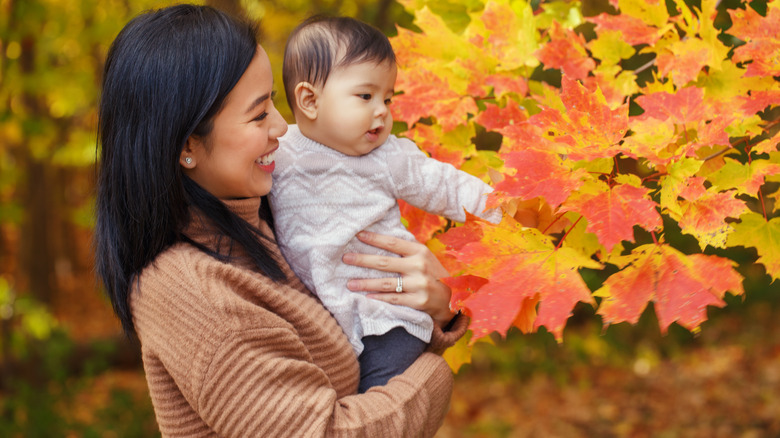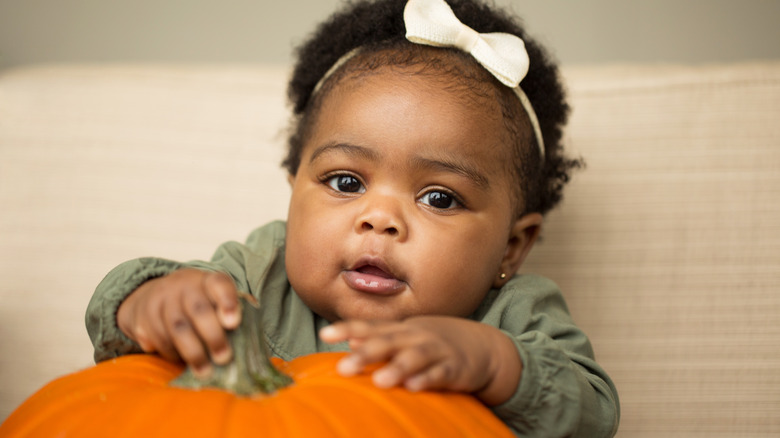What Science Says About Babies Born In October
Just like the signature color-changing leaves of fall, October babies also come with a host of uniquely autumn-specific traits. While science tells us that babies born in different seasons may have varying degrees of physical, mental, and health-related benefits, October babies appear to be bestowed with personality traits that set them up for success.
According to a 2014 study published in the International Journal of Sports Medicine, children born in the month of October proved to be stronger than children born in spring, summer, or winter months in terms of athletic performance. For this reason, parents may find that their October-born babies excel in sports activities throughout their early and adolescent school years.
Why is this? Experts say that for children to be born in October, the individual would have to have become pregnant during the spring. Therefore, with the duration of their pregnancy taking place in the summer months, mothers have increased exposure to vitamin D over mothers whose pregnancies take place primarily during colder months (via The Cut). "With children born in the Northern Hemisphere, those born in autumn tend to have slightly bigger bone and muscle mass," Dr. Gavin Sandercock, lead author of the study, told The Cut.
Health conditions associated with October births
The October-born may also be at a decreased risk for certain health conditions, specifically cardiovascular conditions, according to a 2015 retrospective study published in the Journal of American Medical Informatics Association. Researchers set out to further examine the relationship between birth month and subsequent risk for developing over 1,680 different diseases. Using data from more than 1.7 million New York-Presbyterian/Columbia University Medical Center patients, the study team identified 55 diseases that correlated strongly with birth month. In particular, October ranked as the birth month with the lowest risk for heart conditions such as atrial fibrillation and congestive cardiac failure. Conversely, the study also found that those born in October were at an increased risk for acute upper respiratory infections, as well as nonvenomous insect bites.
When it comes to the connection between disease risk and birth month overall, however, senior study author Dr. Nicholas Tatonetti told the Columbia University Irving Medical Center, "It's important not to get overly nervous about these results because even though we found significant associations the overall disease risk is not that great. The risk related to birth month is relatively minor when compared to more influential variables like diet and exercise."
Halloween may affect the timing of their birth
Eerily enough, science shows us that fewer babies tend to be born on the scariest day of the year — Halloween. Researchers from a 2011 study published in Social Science and Medicine examined whether one's perception of certain holidays due to cultural influences could potentially affect the timing of a baby's birth.
As per the research, the study team compared births that occurred on or around Valentine's Day versus Halloween between 1996 and 2006. Over this time period, researchers noted a 3.6% uptick in spontaneous births and a 12% increase in cesarean section births on Valentine's day. Conversely, the research showed that on the spookiest day of the year, Halloween, there was a 5% decrease in spontaneous births and a 17% decrease in cesarean section births.
Lead researcher on the study Rebecca Levy suggests that the link may lie in Halloween's negative connotations (via New Scientist). Pregnant individuals who equate Halloween with death and monsters, Levy says, may either consciously or subconsciously wish to avoid giving birth on the holiday. "We know that hormones control birth timing, and mothers do often express a desire to give birth on a certain day," she tells the publication. "But the process that allows those thoughts to potentially impact the timing, we don't know."
The mental and emotional health benefits of being an October baby
Additionally, research indicates that October babies also seem to have a longer life expectancy from age 50 onward, compared to those with spring birthdays (via Proceedings of the National Academy of Sciences of the United States of America). Not only are these individuals expected to live longer, but science indicates that October babies are likely to spend those extra years living a full and contented life. For example, according to Motherly, those with October birthdays are more likely to maintain a good state of mental health. They may even have a leg up when it comes to a career in politics, citing that throughout history, more U.S. presidents have had October birthdays than any other month of the year.
Additionally, those born in October are thought to be loving and affectionate in nature, according to Motherly. Armed with charm and positivity, these individuals show a unique ability to connect with others. They also possess an innate ability for analytical thinking (via Parenting) — a great skill set for those considering a career in law!
Whether it comes to physical health, mental health, or career success, autumn babies seem to be as distinct as each brightly-colored fall leaf.




